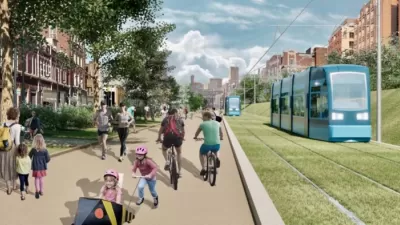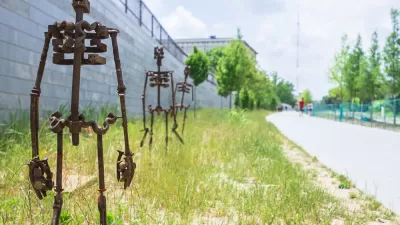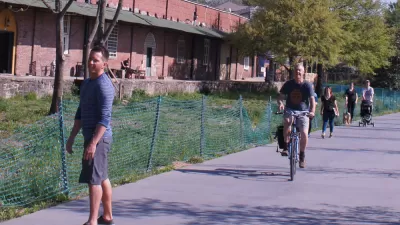The first phase of the Atlanta Streetcar is open to the public, though the city has big plans to extend the line. One planning academic hopes to redirect the planning process.
Mike Dobbins, professor of the practice of planning at Georgia Tech’s College of Architecture and a former commissioner of planning and community development for the city of Atlanta, reviews the planning and political decisions behind the Atlanta Streetcar. In December, the Atlanta City Council approved an extension of the existing streetcar route, including 22 miles of streetcar track running alongside the BeltLine.
Dobbins's review is a critical one, summarized by the following: "While the old railroad segments that make up the BeltLine make a lot of sense for a park and trail system, they are not a solution for the city’s transit problems…" After laying out what a comprehensive transit planning exercise would look like, Dobbins makes the following recommendation:
While a lot of time, money, and effort has gone into trying to make the “solution” fit the problem, with a successful referendum it is not too late to redirect the city’s efforts to catch up with commonsense transit planning. The Legislature last month enabled Atlanta to put forward a referendum in November 2016 or 2017 for a proposed half-percent increase in the city’s sales tax to raise $2.5 billion for transit construction.
According to Dobbins, reborn legislation that would allow Atlanta voters to decide on a half-cent transit tax offers a new chance to start holistic transit planning process.
FULL STORY: Transit Planning 101 for the City of Atlanta: It’s not too late

Alabama: Trump Terminates Settlements for Black Communities Harmed By Raw Sewage
Trump deemed the landmark civil rights agreement “illegal DEI and environmental justice policy.”

Study: Maui’s Plan to Convert Vacation Rentals to Long-Term Housing Could Cause Nearly $1 Billion Economic Loss
The plan would reduce visitor accommodation by 25% resulting in 1,900 jobs lost.

Why Should We Subsidize Public Transportation?
Many public transit agencies face financial stress due to rising costs, declining fare revenue, and declining subsidies. Transit advocates must provide a strong business case for increasing public transit funding.

Wind Energy on the Rise Despite Federal Policy Reversal
The Trump administration is revoking federal support for renewable energy, but demand for new projects continues unabated.

Passengers Flock to Caltrain After Electrification
The new electric trains are running faster and more reliably, leading to strong ridership growth on the Bay Area rail system.

Texas Churches Rally Behind ‘Yes in God’s Back Yard’ Legislation
Religious leaders want the state to reduce zoning regulations to streamline leasing church-owned land to housing developers.
Urban Design for Planners 1: Software Tools
This six-course series explores essential urban design concepts using open source software and equips planners with the tools they need to participate fully in the urban design process.
Planning for Universal Design
Learn the tools for implementing Universal Design in planning regulations.
Caltrans
Smith Gee Studio
Institute for Housing and Urban Development Studies (IHS)
City of Grandview
Harvard GSD Executive Education
Toledo-Lucas County Plan Commissions
Salt Lake City
NYU Wagner Graduate School of Public Service





























